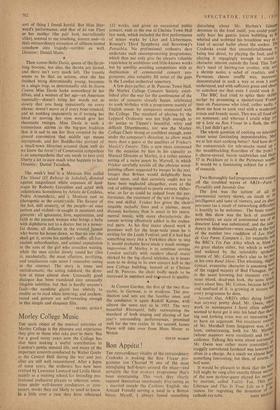Morley College Music
THE main object of the musical activities of Morley College is the pleasure and experience they give to those who take part in them. But for a good many years now the College has also been making a useful contribution to London's public musical life, and many of the important concerts conducted by Walter Goehr at the Central Hall during the war and just after arc still well remembered. After a lapse of some years. the orchestra has now been revived by Lawrence Leonard and Leslie Head. mainly as a training school, for intending pro- fessional orchestral players to rehearse. some- times under well-known conductors or com- posers, works they arc likely to need to know. In a little over a year they have rehearsed cycles. in German. is in proOress. The pro- At Covent Garden. the first of the two Rine duction and sets are the familiar ones, and the conductor is again Rudolf Kempe. with almost the same cast as in 1955. The very beautiful Rheineold, fully maintaining the standard of both singing and playing of last year's outstanding performances, promised well for the two cycles. In the second. James Pease will take over from Hans Hotter as 135 works, and given an occasional public concert, such as the one at Chelsea Town Hall last week, which included the first performance of minor works by Liszt and Liebermann, Roussel's Third Symphony and Stravinsky's Petrushka.' No professional orchestra dare undertake such uncompromising programmes. which thus not only give the players valuable experience in ambitious and little-known works but by sensibly avoiding competition with or duplication of commercial concert pro- grammes, also valuably fill some of the gaps in the London orchestral repertory.
A few days earlier, at St. Pancras Town Hall, the Morley College Concerts Society, estab- lished after the war for the continuance of the series of concerts already begun. celebrated its tenth birthday with a programme mainly of English music by composers connected with the College. The standard of playing by the Leppard Orchestra was not high enough to do justice to Tippett's beautiful, witty and difficult Divertimento, nor was the Morley College Choir strong or confident enough, even under the composer's direction, to allow much more than a .guess at the qualities of Fricker's Musick's Empire. This. a new piece composed for the occasion by him in his capacity as Musical Director at Morley, is a rather austere setting of a naive poem by Marvell, in which Fricker carefully avoids all the obvious word- painting effects suggested by images in the text. images that Britten would delightedly have seized upon, and that certainly ought not to have been neglected altogether, even at the risk of adding musical to poetic naivety. Other- wise, as far as could be judged from the per- forniance, the treatment of the text is imagina- , tive and skilful. Fricker has given the choir,
singable melodic lines and a plainer, more diatonic harinony than is usual in his instru- mental music, with more characteristic dis-
sonant writing effectively added in the orches-
tral parts. As his first major choral work it promises well for the large-scale piece he is writing for the Leeds Festival. and if it had had
something more like a Yorkshire choir to sing it, would probably, have made a much stronger
impression. If Morley is to continue serving London usefully with modern choral music shirked by the big choral giddies. as it hopes soon to he doing in its own concert hall in the new College building. instead of at Chelsea and St. Pancras. the choir badly needs to be increased in numbers and improved in quality.
COLIN MASON


































 Previous page
Previous page